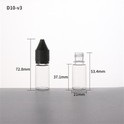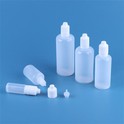The Importance of Plastics
Let’s not forget in the sea of anti-plastic campaigning, that plastic has its merits and plastic has become important in our lives.
The key thing that we need to bear in mind, when having such a backlash on plastics, is that they are actually pretty cool. They solve a lot of problems, they make our lives easier, and (in the main) they can be reused or recycled. And herein lies the huge issue with global plastic pollution – we need to re-use and recycle plastics. Those plastics that cannot be re-used or recycled should (very simply) not be used.
The importance of plastics in reducing food waste
After my last blog one of my friends asked a question which I, myself, had asked just recently. Why, on earth do they wrap a cucumber in plastic? Well, the answer is that the life of the cucumber is extended by up to 2 weeks! There are many other examples of plastics extending the life of products, including fruit, vegetables, meat and fish, breaded goods, salads, food on-the-go and diary. Without these products being stored in plastic before, and indeed after, purchase their shelf life would be considerably reduced and food wastage, which already sits at around 18% of all household waste in the UK, would increase yet further.
On the flip side, however – by pre-packaging fruit and vegetables in bags and punnets the supermarkets are telling us how many of each item we will purchase, and that is not necessarily the number we would buy, were they lose, and can, actually therefore add to the food waste figures.
So, as with many things – the drive for supermarkets to make increases in sales threatens to negate the positives provided by the use of plastic to reduce food waste.
Also, plastics protect food from contamination and germs – keeping us safe and healthy – as does plastic tamper proof packaging.
The importance of plastics in transportation
I am writing this on an aeroplane back from my holiday. I am surrounded by plastic – the internal housings and panels, the overhead lockers, the table, the seat covers, the food and drink packaging, the trays from which the food and drink is served, the windows, and I’m sure that ahead of me, the pilots instruments are at the very least coated in plastic. It is everywhere.
Let’s move to cars, vans and lorries – the use of plastic throughout these vehicles is hugely significant. From aesthetic areas, such as interior fascias, to the vitally important safety features, such as the bumpers, seat-belts and air-bags.
So, why do the manufacturers use so much plastic? There are a number of answers. Firstly plastic is cheaper than alternatives (such as metal). It is also much more quick and easy to mould and form plastics. And finally, plastic is considerably more lightweight than its alternatives. And herein lies a huge benefit and reason why plastic is so important. By taking weight out of vehicles the amount of fuel needed to propel those vehicles is considerably reduced. For every 10% reduction in weight, a vehicle will normally save 5% – 7% in fuel usage. The reduction in vehicle weight also translates to a reduction in CO2 emissions. For every 1lb of weight eliminated from a vehicle translates to 25.3lbs of carbon dioxide saved over the life of the vehicle.
Again, many of the plastics used in vehicles can be recycled, and indeed may already come from recycled plastics. For example many cars use carpets made from recycled PET drink bottles.
The importance of plastics in healthcare
Plastics are used in a wide array of instances in healthcare situations. In the ward they are easily cleanable and can help to improve hygiene and reduce the transmission of disease. In the field plastics can be used once and disposed of (this is a bug bear of mine, because I do not know whether any of this is recycled or whether perfectly good plastics are incinerated. I’ve tried to get “in” but failed). Inside our bodies we now have the opportunity to have plastic heart valves, plastic knee joints and plastic hip joints. Plastic prosthetics help amputee patients regain mobility and quality of life.
The importance of plastics in our every day lives
So we wake up – our alarm clock probably has a plastic housing, we brush our teeth with a plastic toothbrush, we wash our face with products in plastic packaging, we make our breakfast smoothie with a machine made of plastic in a beaker made of plastic, we sit on our plastic toilet seat, we put on our clothes many of which will have man-made (plastic) fibres in them, we pick up our phone which has a plastic casing and plastic components, we shut our windows and front door as we head for work … guess what … made of plastic.
We have become so very reliant on plastic in almost everything we do that it would be hard to imagine a life without plastic. We live in a very consumer-driven society, and with that come the demands for more and more plastics.
Just look around you now – the probability is that you are surrounded by plastic. We have built a society in which it has become impossible to live a life without plastic. So plastic is here to stay – it has genuine benefits to us as humans and to our planet. It also makes our lives more convenient and enjoyable. Plastic has a place. We just need to be sure that we use it to the best of its life and ability and that when we have finished with it that we do our absolute utmost to try to ensure that it goes to the right place so that it can be properly recycled (or incinerated) and not sent to landfill.






